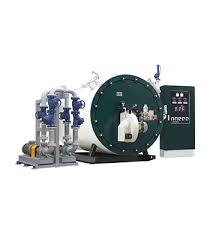
Okt . 18, 2024 18:12 Back to list
Efficient Thermal Oil Boiler Systems for Optimal Heat Transfer Solutions
Thermal Oil Boiler System An Overview
A thermal oil boiler system plays a pivotal role in various industrial processes by providing a reliable and efficient means of heat transfer. These systems have gained popularity due to their ability to operate at high temperatures and low pressures, making them ideal for applications that require heating fluids without exceeding specific pressure limits.
At its core, a thermal oil boiler functions by heating a special type of oil, known as thermal fluid, which is then circulated through a closed-loop system. This oil can withstand temperatures significantly higher than water, often reaching temperatures of over 300°C (572°F) without turning into vapor. This characteristic allows the system to maintain consistent thermal efficiency while reducing the risk of pressure-related hazards.
One notable advantage of thermal oil boiler systems is their operational flexibility
. They can be used in a variety of processes across different industries, including food processing, chemical production, pharmaceuticals, rubber manufacturing, and energy generation. In these applications, the thermal oil can be used to heat reactors, dryers, and heat exchangers, among others, resulting in improved productivity and product quality.thermal oil boiler system

The design of a thermal oil boiler includes several essential components the heater, thermal fluid, circulation pumps, expansion tank, and heat exchangers. The heater is the heart of the system, where the thermal fluid is heated by either gas, oil, or solid fuel combustion. The circulation pumps ensure that the heated thermal fluid is efficiently circulated throughout the system, while the expansion tank accommodates any changes in fluid volume due to temperature fluctuations.
Safety is a crucial aspect of thermal oil boiler systems. While these systems operate at lower pressures than traditional steam boilers, the high-temperature thermal oil can pose risks if not managed correctly. Therefore, modern thermal oil systems are equipped with advanced safety features such as temperature and pressure monitoring, automatic shutdown systems, and safety relief valves. Regular maintenance and operator training are also essential to prevent accidents and ensure optimal performance.
Energy efficiency is another critical factor contributing to the popularity of thermal oil boiler systems. The ability to recover and utilize waste heat can significantly enhance overall system efficiency. Many modern installations incorporate heat recovery systems that capture excess heat for reuse, further reducing energy consumption and operational costs.
In conclusion, thermal oil boiler systems are an invaluable asset in many industrial sectors. Their capacity to provide high-temperature heat without the complications associated with high-pressure steam systems makes them an attractive choice for various heating applications. As industries continue to seek more efficient and safer heating solutions, the adoption of thermal oil boiler technology is likely to grow, demonstrating its essential role in the future of industrial operations.
-
Best Steam Boiler Design PDF Free Design Calculation & Diagram Downloads
NewsJun.10,2025
-
Hot Boiler Water Heater Efficient Heating Solutions for Home & Commercial Use
NewsJun.10,2025
-
Steam Boiler Safety Devices High-Quality Protection Valves
NewsJun.10,2025
-
Ultimate Steam Boiler Checklist for Safety & Efficiency
NewsJun.10,2025
-
Optimal Hot Water Boiler Temperature Setting Guide
NewsJun.10,2025
-
Effective Hot Water Boiler Chemical Treatment Protect & Maintain
NewsJun.09,2025
Related PRODUCTS






















